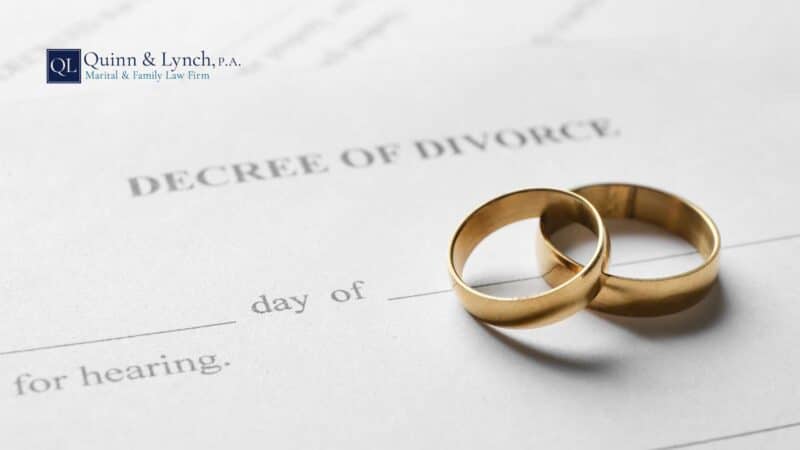Divorce after retirement in Florida can bring a significant change. Older couples who have reached retirement age must deal with the financial implications of dividing everything after so many years of marriage–retirement income, social security benefits, pension plans, savings, and more, to go through a late-life divorce.
According to Psychology Today, Florida divorce rates among married couples at retirement age have steadily increased, known as a national trend termed “gray divorce.” Since 1990, the divorce rate for those over 50 has doubled, with predictions for gray divorce rates to triple by 2030.
Florida’s status as a destination for many couples, after they retire, contributes to the statistics for the gray divorce rate locally. However, as older couples age, they face unique challenges that can end their marriages. The retirement age group now has longer lifespans, larger financial implications for mistakes, and evolving personal goals that can play a role in divorce after retirement or even after their adult children have left the house.
Furthermore, one type of alimony in Florida, permanent support, was recently eliminated, which greatly affected marriages in which one spouse had a significantly higher income than the other partner. While Florida law aims to provide the same level of protection for both men and women in divorces after retirement age, after decades with one partner, each individual must form a new relationship with money after they’re divorced.
Our Tampa divorce attorneys have provided experienced legal counsel for many couples facing a late-life divorce. We understand what a fair divorce settlement looks like for couples who are divorced at retirement age. Whether you’re concerned about splitting joint assets with a former spouse, having an understanding of how much income you’ll need, or how Florida’s property division laws impact your gray divorce in Florida, we can help.
If you’re facing divorce after retirement and need a trusted partner to help you understand the financial obligations and implications of divorcing your spouse after retirement age, call 813-223-7739 to speak with a divorce attorney at Quinn & Lynch, P.A.
What is Gray Divorce?
As older couples age, the after-retirement divorce rates have increased drastically over the past few decades. This retirement-age divorce is termed gray divorce, describing many couples who’ve ended their marriages after decades in a relationship with one spouse.
According to the Census Bureau, adults ages 55-64 have the highest divorce rate among any age group at 43%
Gray divorce rates, or divorces after retirement age for married couples, are attributed to individuals living longer and the recent shift in the wellness culture. This shift gives a sense that living longer means more opportunities—starting a new relationship that brings joy and a newfound freedom associated with a fresh start. For many spouses, women especially, deciding to divorce comes after the adult children have left the house. Again, the sense of newfound freedom is the buzzword for retirement-aged divorced individuals.
Facing a gray divorce after so many years or decades with one spouse can bring a whirlwind of financial obligations and implications, on top of health concerns that tend to spike once individuals have reached retirement age.
Having a better understanding of the financial implications after a gray divorce can help each partner ensure better financial security for themself in their next life chapter.
Gray Divorce Regrets
Many couples experience gray divorce regrets in Florida due to changes in money, social security benefits, and lifestyle. When older couples who are at retirement age decide they want a gray divorce, they must adjust to a lower household income and make important decisions regarding money and other assets, such as moving money to an investment account, purchasing a new house, or buying out home equity in divorce, and for tech-savvy divorcing couples, splitting crypto in divorce.
These financial adjustments and the emotional weight of ending a long-term marriage can make this process difficult.
A Tampa divorce attorney from our law firm can help you understand how alimony works in Florida or how marital assets are divided in a divorce. We can also connect you with a certified divorce financial analyst in Florida to ease concerns and reduce the chance of gray divorce regrets.
Florida Grey Divorce Alimony and Spousal Support
For many people divorcing after retirement in Florida, alimony, or spousal support, is a critical means of income. Florida alimony law considers the length of marriage, the needs of each spouse, and other factors to determine if the court will order alimony.
Many older adults won’t retire until they think they’re financially able to. Gray divorce can affect this overall financial security before you retire or after you’ve reached retirement, especially in cases where one spouse has depended on the other partner for income or money throughout the marriage.
On top of adult children leaving the “nest” and health concerns that arise in these age groups, being divorced after retirement, for many, means coming up with creative solutions to manage Social Security income and building additional assets to get each spouse through their longer lifespans.
A Florida alimony calculator can provide a general idea of standard alimony payments. Our Tampa alimony lawyers have also outlined what disqualifies you from alimony in Florida on our website.

Separation Pension Spouse Rights in Florida
Any pension earned during the marriage is considered a joint asset. As a joint asset, the pension will be divided between you and your ex-spouse under Florida’s equitable distribution laws in a gray divorce. To facilitate this, a Qualified Domestic Relations Order (QDRO) is often required.
Only the retirement or pension income earned during the marriage is subject to division; any benefits accrued before the marriage are generally considered separate property. Whether it’s a 401(k), IRA, or other retirement account, one partner may be entitled to their share of the assets during divorce. Understanding how retirement savings are divided can help protect your financial future.
Consulting with financial professionals and experienced divorce attorneys can help clarify what to expect during the divorce and how dividing pension investments in a gray divorce might impact your future finances.
What is a QDRO?
When a married couple near retirement age decides to get divorced, dividing certain retirement accounts require special attention. If you and your spouse are deciding to end your relationship and need to split retirement funds fairly, a legal document called a Qualified Domestic Relations Order (QDRO) is used.
Our Tampa asset protection attorney team can guide you through the QDRO process.
How are Marital Assets Divided in Florida Divorce After Retirement?
Our Tampa property division lawyers are often asked, “How are marital assets divided in a Florida divorce?”
Marital assets like property, savings, and pension assets are divided equitably in divorce, meaning they’re split fairly, not equally. The court considers the length of the marriage, contributions from each spouse, such as income or child-rearing, and the future financial needs of both partners. This process covers all marital assets, including real estate, investment accounts, and other property shared between spouses.
This is why legal experts don’t recommend removing marital property before divorce in Florida. You could be removing community assets that are subject to division in gray divorce.

Divorce and Retirement Accounts in Florida
When pursuing a gray divorce, many women ask “What are stay at home mom divorce rights in Florida after my adult children have left our home?” and “What is a wife entitled to in a divorce in Florida?”
Typically, retirement savings and financial assets accumulated during the marriage are considered marital property and divided equitably. This includes IRAs, 401(k) plans, and pension investments.
With the gray divorce rate climbing as couples age over 50, understanding how retirement assets are split when you retire, and divorce is essential to protecting your financial future after your marriage ends.
Company Retirement Accounts vs 401k Plans
In Florida, a company retirement plan and 401(k) plan are each considered a joint asset subject to equitable distribution with your former spouse during a divorce after retirement. For individuals divorcing at retirement age, the division process for these accounts involves the following.
- Only the portion of the retirement account accrued during the marriage is subject to division. Contributions and earnings prior to the marriage are non-marital property.
- The current value of the marital portion of each retirement account is assessed to facilitate equitable distribution.
- For 401(k) plans and certain company retirement funds governed by the Employee Retirement Income Security Act (ERISA), a QDRO is necessary.
- Division Methods:
- Direct Transfer: The non-employee spouse may receive their share directly into their own retirement account, maintaining the tax-deferred status.
- Deferred Distribution: In cases involving a pension or defined benefit plan, the non-employee spouse may receive payments upon the employee spouse’s retirement.
- Asset division must be handled properly to avoid tax liabilities. A QDRO ensures the transfer isn’t taxable.
The specifics of dividing company retirement accounts and divorce finances in Florida vary. Our attorneys can help navigate the complexities of retirement account division during a gray divorce in Florida.
Government Pensions and Divorce
Florida state government pension plans are subject to equitable distribution during a divorce, meaning the portion accrued during the marriage is considered marital property. Consulting an experienced divorce attorney can help protect your rights, ensuring a fair divorce settlement.
Federal Government Pension
Federal pensions, such as those under the Civil Service Retirement System (CSRS) or the Federal Employees Retirement System (FERS), are not governed by the Employee Retirement Income Security Act (ERISA) and do not require a QDRO for division. Instead, a Court Order Acceptable for Processing (COAP) is used to instruct the Office of Personnel Management (OPM) on how to allocate the pension benefits.
State and Local Government Pension
In Florida, government employees may participate in the Florida Retirement System (FRS) or other municipal pension plans. The FRS voluntarily accepts QDROs, allowing for direct division of retirement benefits. However, municipal pension plans are not required to accept QDROs. In cases where a municipal plan does not accept a QDRO, the non-employee spouse may need to negotiate a settlement.

Military Retirement Divorce in Florida
Military retirement benefits are unique in divorce cases, as specific rules govern their division. Unlike other retirement plans, military pensions follow federal regulations, ensuring that benefits are divided based on the service member’s rank and years of service at the time of divorce, not at retirement. This is particularly relevant across age groups facing late-life divorces, where each party’s financial needs may not be at the same level.
If you or your spouse is a military retiree, our Tampa military divorce lawyer group can guide you through the details specific to military marriages.
When Do Military Retirement Pension Rules Change?
Military retirement pension rules have undergone significant changes over the years, notably with the introduction of the Blended Retirement System (BRS) which combined elements of the traditional pension system with contributions to the Thrift Savings Plan (TSP), offering a more flexible retirement benefit structure.
Additionally, annual adjustments to military retirement pay occur through Cost of Living Adjustments (COLA), which are based on changes in the Consumer Price Index (CPI). These adjustments help ensure that retirement pay maintains its purchasing power.
Another change is the “Frozen Benefit Rule” under the National Defense Authorization Act, requiring that military pension accounts be divided based on the service member’s rank and years of service at the time of divorce, not retirement.
These new laws impact military divorce cases. Using an updated Florida military divorce checklist can help ensure you’re prepared.

How an Experienced Divorce Attorney Can Help With Gray Divorces in Tampa, FL
If you’re dealing with a gray divorce in Florida, our Tampa high-asset divorce lawyer can help you manage the financial implications of dividing substantial assets, including retirement savings, pensions, and real estate, by offering creative solutions that protect your financial interest during the gray divorce process. Call 813-223-7739 or contact us online to schedule a consultation with a Tampa divorce lawyer.
















